Assistant Professor Carlos Diaz Ruiz: "Conspiracy theories circulate by fuelling social anxieties and stoking tribalism”

Carlos Diaz Ruiz specialises in disinformation research. He studied the echo chambers on YouTube that spread conspiracy theories, including the Flat Earth beliefs. Beyond their belief that the Earth is flat, what these YouTube channels have in common is they present an existential conflict, a culture war between us against them.
In culture wars, public policy becomes tribalistic. In other words, conspiracy theorists turn public policy into a battle against perceived opponents. When public policy is seen through the lens of conspiracy theories, it undermines democratic governance because it makes elected officials look suspicious.
Diaz Ruiz has dived into the arguments used in the thousands of flat earth videos on YouTube. He identified three culture wars: Christians against atheists, folk heroes against the elite, and freethinkers versus scientists.
“The first argument portrays the flat Earth view as a defence of Christianity. The second argument inserts the flat Earth view as the counter to the government’s control of knowledge. The third argument sides with freethinkers who think that relevant knowledge does not come from books.”
According to Diaz Ruiz, these groups come together into an unexpected alliance, where they have mutual enemies in common. Their aims to build fringe audiences to capture clicks and likes.
“Radical ideas are not a bad thing for society. For example, not so long time ago, women’s suffrage was a radical idea. The issue with conspiracy theories is their reliance on culture wars and neo-tribalism to set up public policy to attack perceived enemies,” Diaz Ruiz argues.
To know more, please consult the research article:
Diaz Ruiz, C., & Nilsson, T. (2023). Disinformation and Echo Chambers: How Disinformation Circulates on Social Media Through Identity-Driven Controversies
Journal of Public Policy & Marketing, 42(1), 18-35.
Carlos Diaz Ruiz was one of the speakers from Hanken School of Economics at the Vaasa Arts and Science Carnival 17-18.11.2023. Other participants from Hanken during the carnival:
Maria Ehrnström-Fuentes: “Kan människa och natur samarbeta för att återställa den ekologiska balansen”
Man Yang and Eva-Lena Lundgren:”Becoming sustainable female entrepreneurs”
Frida Nyqvist: “Are we villains or survivors? Stories from the restaurant industry during Covid-19”
Text and photo: Marlene Günsberg

